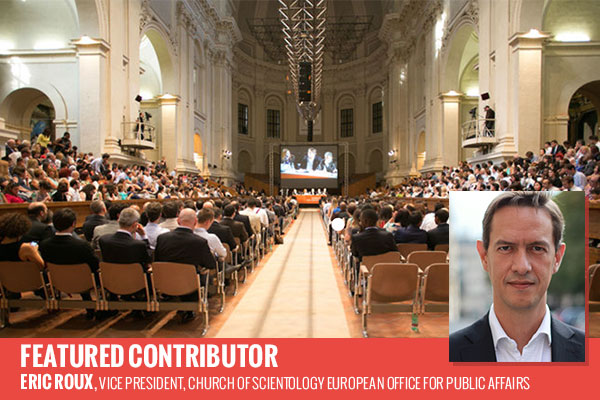
Panel on the Scientology Religion Held at the Inaugural Conference of the European Academy of Religions
- By Eric Roux --
- 06 Oct 2017 --

Article by Eric Roux, Vice President of the Church of Scientology European Office for Public Affairs and Human Rights, and President of the European Interreligious Forum for Religious Freedom, about panel on the Church of Scientology at the inaugural conference of the European Academy of Religions
The newly created European Academy of Religions was launched in June 2017 with a conference titled “Ex Nihilo,” a play on words on the Latin for “out of nothing,” usually employed in the context of The Creation. Attending the program in Bologna, Italy, held under the patronage of the European Parliament, the European Commission, the Ministry of Education of Italy and other prestigious institutions, were a thousand scholars from across Europe and beyond representing a wide range of disciplines associated with the study of religions. The conference included a panel discussion on the Scientology religion.
Panel on the Scientology Religion Held at the Inaugural Conference of the European Academy of Religions[/tweetthis]
Scientific Panel on Scientology Aesthetics and Ethics
Panelists were Professor Massimo Introvigne, Director of CESNUR (Center for Studies of New Religions); Professor Luigi Berzano, Professor Emeritus with Department of Cultures, Politics and Society of the University of Turin; and Professor Sylvio Calzolari, affiliated with the Theological Faculty of Central Italy in Florence. A thousand scholars from across Europe attended the inaugural conference of the European Academy of Religion in Bolognia, Italy.
Mr. Introvigne described the many aspects of Scientology that are related to the visual arts, explaining that Scientology Scriptures written by L. Ron Hubbard contain many references to the power of art in spiritual enlightenment, as well as practical tools for artists that are commonly used by Scientology visual artists. He then went through the work of Scientologists he personally interviewed who are well-known visual artists, extracting from it what could be considered as “sacred art” from a Scientology perspective. Finally, he explained that this artistic view, stemming from knowledge of Scientology, can be discovered in the new Churches of Scientology called Ideal Churches, such as the Scientology “cathedral,” the Flag Land Base in Clearwater, Florida, that contains dozens of pieces of magnificent works of art illustrating the basic tenets of the Scientology religion. In conclusion, he said that Scientology “creates and cultivates a community of artists, and does more than offer practical advice.”
Professor Luigi Berzano delivered a presentation on “Scientology’s Spatial Aesthetics,” based on the premise that aesthetic nature belongs specifically and primarily to spiritual and religious forms, such as Scientology, and that the social science of religion should refer to it as such. He described the various sacred places one can find in a Church of Scientology, and their relationship to the sacred Scriptures and practices of Mr. Hubbard’s vision—a place of worship, seeking, and spiritual freedom. “Each one is the cornerstone of a new, better, world,” he said.
Rounding out the program, Professor Sylvio Calzolari explored the Ethics of Scientology as developed by Mr. Hubbard. “The mission of the religious ethics of Scientology is to increase man’s awareness so as to restore his condition of ethical harmony,” he said. “Spiritual salvation depends on self-knowledge, on relationships with others (another reference to ethics as ‘praxis’—the act of engaging, applying, exercising, realizing, or practicing ideas) and one’s sense of belonging to the whole universe.” He described the place of Scientology ethics in the whole philosophical system that Scientology forms, and stressed the rationality that he found in it. He finally stated, after a long and brilliant exposé of Scientology tenets: “I am not a Scientologist, but I need to say that studying what Scientology really is, I am a true supporter of it.”
Transcripts of the Scientology panel are available on the CESNUR website
Belgium Case Law and the Significance of the latest Scientology win in Brussels
Additionally, Germana Carobene, professor at the University of Canonic Law of Naples, delivered a presentation on Belgium case law and concluded that the most recent Belgian Court decision on Scientology March 11, 2016, dismissing all charges and completely acquitting Scientology Church bodies and individual defendants, constitutes a landmark decision: “one of the most important decisions for the judicial affirmation of freedom of religion.”



















